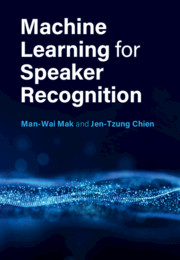
-
Select format
-
- Publisher:
- Cambridge University Press
- Publication date:
- June 2020
- November 2020
- ISBN:
- 9781108552332
- 9781108428125
- Dimensions:
- (247 x 174 mm)
- Weight & Pages:
- 0.76kg, 334 Pages
- Dimensions:
- Weight & Pages:
You may already have access via personal or institutional login
Book description
This book will help readers understand fundamental and advanced statistical models and deep learning models for robust speaker recognition and domain adaptation. This useful toolkit enables readers to apply machine learning techniques to address practical issues, such as robustness under adverse acoustic environments and domain mismatch, when deploying speaker recognition systems. Presenting state-of-the-art machine learning techniques for speaker recognition and featuring a range of probabilistic models, learning algorithms, case studies, and new trends and directions for speaker recognition based on modern machine learning and deep learning, this is the perfect resource for graduates, researchers, practitioners and engineers in electrical engineering, computer science and applied mathematics.
Reviews
‘There is a need for an accessible textbook to help newcomers to enter the field [of automatic speaker recognition]. Machine Learning for Speaker Recognition by Man-Wai Mak and Jen-Tzung Chien serves such a need. Both authors are highly seasoned in the field. They cover both fundamental techniques and state-of-the-art methods at an accessible level using the language of modern probabilistic machine learning. The authors cover different components of speaker recognition systems including feature extraction, back-end modeling and scoring, along with various case studies. The book is well suited for the needs of graduate students and researchers in electrical engineering and computer science, along with practitioners. Apart from basic prerequisites in calculus, linear algebra, probabilities and statistics, the textbook provides a coherent and self-contained journey into what modern automatic speaker recognition is about.’
Tomi Kinnunen - University of Eastern Finland
'The topical coverage is spot-on, and the text discusses many key algorithms that support statistical learning approaches, including hybrid models, deep learning classification, and generative methods. In addition, the authors provide a deep mathematical exploration into versions of algorithms, optimization approaches, and domain adaptation statistics within the context of signal processing. The extensive diagrams, linear algebra notation, and mathematical calculus machinery will support developers who are building new implementations or need to look under the hood of existing systems. Highly Recommended.'
J. Brzezinski Source: Choice
Contents
Metrics
Altmetric attention score
Full text views
Full text views help Loading metrics...
Loading metrics...
* Views captured on Cambridge Core between #date#. This data will be updated every 24 hours.
Usage data cannot currently be displayed.
Accessibility standard: Unknown
Why this information is here
This section outlines the accessibility features of this content - including support for screen readers, full keyboard navigation and high-contrast display options. This may not be relevant for you.
Accessibility Information
Accessibility compliance for the PDF of this book is currently unknown and may be updated in the future.


